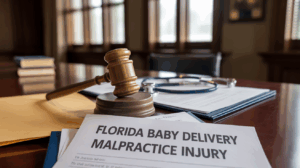
Though most births take place without serious complications, doctors can make tragic mistakes. Signs that fetal death was caused by medical negligence include inadequate response to fetal distress, misinterpretation of test results, or failure to act on abnormal symptoms.
If you recognize any of these red flags, they may be signs that fetal death was caused by mistake. A Fort Lauderdale birth injury lawyer can help your family pursue justice.
Signals That Fetal Death Was Caused by Medical Negligence
Experiencing the loss of a child is devastating, especially if you suspect it may have been preventable. While not all pregnancy complications occur due to medical error, certain warning signs can indicate lapses in care during pregnancy, labor, or delivery. Common red flags include:
Unexplained Delays in Treatment or Diagnosis
Timely medical intervention is critical during pregnancy. Delays in diagnosing or treating complications can place both mother and baby at serious risk.
Waiting too long for test results, hesitating to respond to symptoms, or postponing necessary procedures can all signal a failure in care.
Failure to Monitor Fetal Distress
Proper monitoring during labor is essential to detect early signs of fetal distress, such as abnormal heart rate patterns or decreased movement. If these warning signs are overlooked or ignored, the baby may face life-threatening complications.
Prompt intervention, whether through medications, additional testing, or emergency delivery, is necessary to prevent fatal complications.
Missed or Misinterpreted Prenatal Test Results
If blood tests or screenings reveal concerning findings that are ignored, critical interventions may be delayed. Failure to communicate abnormal results or follow up appropriately is another red flag.
In addition, misinterpreting ultrasound images can lead to the failure to identify issues like restricted fetal growth, abnormal heart rates, or amniotic fluid imbalances.
Incorrect Use of Labor and Delivery Tools
Forceps, vacuum extractors, and other delivery instruments must be used correctly. Improper use can lead to trauma, including bruising, cuts, skull fractures, or brain bleeds.
Sudden complications during delivery may also indicate mishandling of these tools, which can potentially contribute to fetal death.
Evidence of Untreated Infections or Conditions
Infections like Group B strep, toxoplasmosis, or listeria should be identified and treated promptly. Failure to do so can result in preventable fetal harm.
Persistent fever, unusual pain, or abnormal discharge may signal an underlying condition. If these conditions are dismissed, serious complications can occur.
Medication Errors During Pregnancy or Labor
Medication management during pregnancy and labor requires careful oversight. Errors like incorrect dosages, inappropriate drugs, or overlooked interactions can lead to dangerous complications for both the mother and the baby.
Warning signs include unusual fetal heart rate changes, severe maternal reactions, or missing medication documentation.
Lack of Informed Consent or Communication
Expectant parents must receive clear information about the risks, alternatives, and potential outcomes of procedures or medications. When medical decisions are made without informed consent or when critical details are withheld, it can result in preventable complications.
Poor communication may also leave patients unprepared to respond to issues during delivery.
Sudden Complications Without Medical Explanation
Unexpected complications during pregnancy can be alarming. While not all sudden complications indicate negligence, unexplained outcomes may suggest a lapse in care.
If your child’s healthcare providers cannot explain the loss of your child, further investigation may be warranted.
What Is the Most Common Cause of Fetal Death?
Fetal death can often be prevented with proper prenatal care. Medical negligence contributes to fetal death when warning signs of dangerous conditions are ignored, misdiagnosed, or treated too late. Common causes of preventable fetal death include:
- Placental complications: Placental abruption or insufficiency can deprive the baby of oxygen and nutrients.
- Umbilical cord issues: Twists, knots, or prolapse of the cord may interrupt blood flow to the fetus.
- Maternal health conditions: High blood pressure, diabetes, infections, or clotting disorders can significantly increase the risk of fetal death.
- Birth defects or genetic conditions: Some fetal abnormalities are not detectable until late in pregnancy.
Our medical malpractice lawyers can help determine whether medical negligence caused the loss of your child.
How Do I Prove Medical Malpractice?
To prove that fetal death was caused by medical negligence, you must show that your healthcare provider failed to meet the accepted standard of care and that this failure had fatal results.
Test results, ultrasounds, hospital records, and witness statements can support your claim. Our medical malpractice attorneys can help gather evidence, consult experts, and hold your child’s care team accountable.
Suspect a Medical Mistake Caused Your Child’s Death? Contact Us for a Free Consultation
Fetal death is a heartbreaking experience. While not all complications are preventable, the warning signs outlined above can help you identify whether a lapse in care may have contributed to your loss.
Timely recognition of these issues can provide clarity, ensure accountability, and potentially prevent similar tragedies for other families. If you suspect that the loss of your child was preventable, a birth injury lawyer from Anidjar & Levine can help you take legal action.
Schedule a free consultation to get help from our legal team today.








